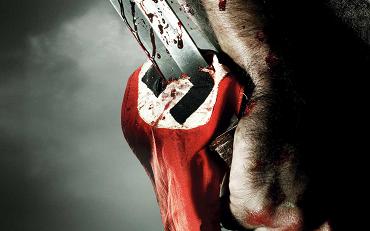Take a ruthless Nazi leader who can order the deaths of a Jewish family with the same dispassion with which he requests a glass of milk. Mix his story with that of a Jewish woman who flees the slaughter of her family only to grow up and discover an opportunity to kill Hitler himself. Add in a cocky American Lieutenant named Aldo Raine (Brad Pitt) who leads a secret mission in which each of his men are ordered to scalp 100 Nazi, and you’ve got the combustible mix of lead characters who cross paths with explosive results in Oscar-winning writer-director Quentin Tarantino’s latest film, “Inglourious Basterds.”
Bringing together his usual strengths as a director of intense performances from sterling casts, an amazing score pasted together from classic scores of past films, incredibly sharp and catchy dialogue and a warped time frame that that will throw viewers through a satisfying series of loops, Tarantino has easily made his best film since “Pulp Fiction.” Coming off a humiliating misfire with 2007’s “Death Proof,” which was half of the box-office disaster known as “Grindhouse,” Tarantino has admitted that he felt the need to double down on his strengths and prove that he was just as relevant and inventive as ever.
With “Basterds,” a dream project of Tarantino’s for the past decade, he has accomplished all that and more. The result is a (mostly) fast-paced, multi-layered and entertainingly violent film that has the audacity to completely reinvent the way WWII went down in flames for the Germans and get away with it.
The film’s innovative structure tells the story in five distinct chapters, using the first three to establish the main characters in their own storylines. This serves all the better to make the fast action and double-crosses that make up the final two sections more emotionally involving and edge-of-your-seat exciting since by the time things really kick in, you’re fully invested in all the characters.
“Basterds” opens with ace Nazi Col. Landa (in a star-making and likely Oscar-nominated performance by Austrian actor Christoph Waltz, in his American film debut) squaring off against a French farmer he suspects is harboring a Jewish family beneath his floorboards. The conversation between the two surpasses the classic discussion of hamburgers and foot rubs that Samuel L. Jackson and John Travolta shared en route to a hit job in “Pulp Fiction,” for while its dialogue is perfectly etched and delivered, it also reveals layer after layer of the depravity in Landa’s soul and creates the tension of a ever-worsening life-and-death situation almost exclusively through the words expressed rather than overblown violence.
The second chapter opens with the now-ubiquitous scene of Pitt’s Aldo Raine challenging a team of Jewish American soldiers to take down all the Nazis they can, and collect 100 Nazi scalps each, and brings the heroes to vibrant, darkly humorous life. The third chapter guides us into the subtly building tension of a young, secretly Jewish woman named Shosanna (Melanie Laurent) who escaped Col. Landa three years earlier and now operates a Parisian cinema.
As she tries to fend off the attentions of a slimy yet handsome young Nazi war hero named Fredrick Zoller (Daniel Bruhl), Shosanna comes to realize that his request to show the premiere of a propagandistic war film about his exploits that he stars in will offer her the chance to have hundreds of Nazi leaders including Hitler himself seated together in the dark of her theater. And so it is that in the fourth and fifth chapters, Shosanna teams with Aldo Raine’s men to set up the perfect revenge and perhaps end the war itself.
“Inglourious Basterds” wildly re-imagines the way in which the Nazis were defeated in WWII, but its unhinged take on historic events still proves to be immensely entertaining and there are no blatant anti-American messages stuck into the film’s script as in many other modern war movies. Pitt and his men are unabashed heroes you want to root for. Every performer appears to be having a blast, both in their often over-the-top action scenes and in the extensive dialogue and planning scenes that put all the pieces of the plot puzzle into place. And one more good aspect to note is that Tarantino has learned to curb his worst impulses of graphic violence and excessive profanity to make a film that has some of both but in a more restrained level than his usual.
The only fault to be found is that some of the dialogue scenes stretch the talking almost to the limit of attention spans, especially among viewers who were led to believe by the simplified, Pitt-centered commercials that the movie is composed of wall-to-wall Nazi-killing. Having to follow many of these scenes in subtitles might turn off some prospective viewers, especially those who might otherwise seek out repeated viewings of an ass-kicking flick, but for those who appreciate quality filmmaking to go with a rousing good time, “Inglourious Basterds” easily fills the bill.


COMMENTS
Please let us know if you're having issues with commenting.